Young people don't understand Kant?It's okay, Wang Guowei can't understand
Author:People's Literature Publishin Time:2022.06.30
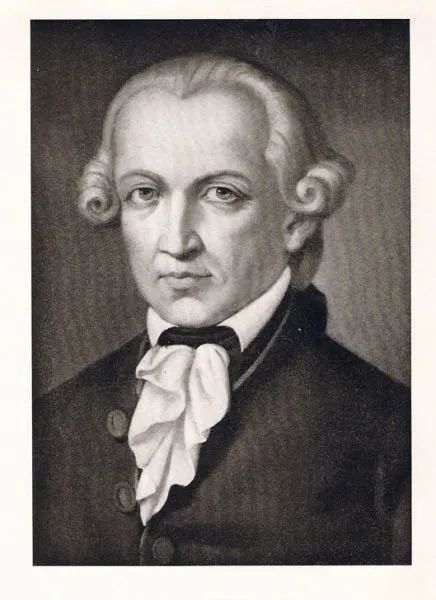
Kant is called a bridge that must be passed if you want to learn philosophy, and it is very difficult to cross this bridge. Each discipline has a history of discipline development. Sometimes, in a specific stage of development, the way of thinking and expression adopted by this subject will bring reading difficulties to those who have not been trained. Kant is like this. But this character should have something to know.

Wang Guowei and Kant
Kant's works have always been famous for unparalleled reading. Many of his emperors are written in German in the late 18th century. At that time, the style of writing was relatively obscure and liked to use long sentences. Therefore, someone joked later that the main difficulties of reading Kant's works came from the fingers too little, because after reading a sentence, pressing one finger, and then reading one finger, ten fingers, one, one, one, one The sentence is not over yet. Reading his work, it seemed to be more than the difficulty of human physiological limit. But in another aspect, some of his basic ideas may be what we can contact and understand. If it is difficult to read some of his works, we can read some relatively easy works to read. If we read such a book, if we feel a little difficult at the beginning, do not lose confidence because of this, so as to doubt our IQ.
We all know that Wang Guowei has a monument on the Tsinghua campus -Mr. Haining Wang Jing'an Monument. Wang Guowei is a well -deserved genius, and has made outstanding contributions in many aspects. He studied the Oracle Bone text just discovered at the time, confirming the unearthed literature with the handed down literature, and in the study of the ancient history of the ancient history. Later, he studied the history of the opera and wrote the "Song and Yuan Opera Examination". The previous one with a summary "; he introduced and studied Western philosophy, studied Kant, Schopenhauer, Nietzsche, and achieved great achievements. The first real Chinese and Western literature comparative research papers, "Extraordinary Words" proposed the "Three Realms" theory, and so on, and made very high achievements in all aspects. It should not be exaggerated to say that he is genius.

Haining Wang Jing'an Monument Monument
Wang Guowei's early thoughts were very influenced by Kant, and his experience of reading Kant's work seems to be smooth. At first I felt that I couldn't understand it. Later, I read it a little bit, but I still went to read Schopenhauer. He was also affected by Schopenhauer. His "Dream of Red Mansions" was written by Schopenhauer's pessimistic philosophy. After Wang Guowei read Schopenhauer, he turned back to Kant, repeated several times, and suddenly opened up. According to his own statement, if there is still a little twisted place in the middle, maybe it is the awkward place in Kant's thought itself.
If a genius such as Wang Guowei reads Kant such a serious difficulty, then when we encounter such difficulties, we can't make a deep doubt about ourselves. Of course, the background of the times is different. There is a reason for Wang Guowei's reading of Kant in difficulties, that is, he does not have the literacy of modern natural science. And now young people are probably this literacy. Furthermore, the Western school was introduced shortly at that time, and the understanding of some basic categories and concepts of Western philosophy was the same as today.
We started from the basic position of Kant's philosophy, and then we mainly explained and comment on his "moral philosophy" and his ethics. Still talking about Wang Guowei.
Wang Guowei died of suicide, and an unusual character committed suicide. People always have a curiosity about his death. Wang Guowei's suicide has become a research topic of many papers. There are various analysis of his death. Some people say that he is "martyrdom", the suicide note he left, and the behavior of him who has been refused to cut the braids, as if he shows that he is very nostalgic for the Qing Dynasty who has already gone. However, this statement is not very reliable. Although he still has a braid and expressed some nostalgia, maybe Chen Yinque said to him, who wrote him inscriptions, said that he was even more nostalgic for the traditional Chinese culture that linked to that dynasty, and he was He began to feel the fate of this culture helpless. Maybe he was actually buried for this culture. We do not explore much about his death. In short, this person is the genius of philosophy and the genius of literature -the reason why it is regarded as a genius is at least one reason is that he is more sensitive to the confusion of life than us.

Summer Palace Yuzaoxuan Kunming Lake
Wang Guowei has always been in the exploration of thought and constant confusion. He has achieved outstanding achievements in different academic fields, but the conversion of back and forth between different academic fields also shows the mental difficulties he encounters and constantly find exports. Later, he once expressed the conflict that his thoughts encountered:
In philosophical speaking, most of the cute people are not credible and credible. Yu Zhi truth, and Yu loves its fallacy. Great metaphysics, high strict ethics and pure aesthetics, this is also cool. However, those who are trusted, Ning Ning's empirical theory, ethical theory and aesthetic theory in ethical theory. Knowing it is credible and unable to love, he feels cute and unbelievable, the biggest trouble in the past two or three years.
He said that the philosophical doctrine is cute and unbelievable. Because philosophy should be a discipline of conceptual thinking, philosophy should be to resort to human reason, resort to human reasoning ability, and resort to human speculation. Intersection This is sometimes difficult to say. For example, the British poet Corler's ruling that has deeply influenced Xiaomeier, a poet with a philosophical temperament, once had a famous saying: "There is a life for the Plato School, and a life and a Aristotle." We know that although Plato and Aristotle are the relationship between masters and apprentices, their basic philosophical positions are very different. To say that there is a life for the Plato, and a life for the Aristotle, it seems that the philosophy of what kind of philosophy a person is finally chosen is not demonstrated by rationality, but the natural tendency. Many people have similar views. So there is an extreme statement that philosophy is to find a reason to believe what you have already believed. Indeed, any doctrine system has its component of rational debate, and you can test it from theoretical logic. But it also has a basic premise. Agree with this premise, you can follow, and disagree with this premise. A system may be invalid to you. Therefore, between credibility and cuteness, sometimes contradictions occur. The realm of a certain theory is very attractive, but theoretically and logically cannot persuade me; and other doctrine, in theory and logic, make me feel impeccable. However Word. This situation may really exist.
We return to Wang Guowei. He said, "Great metaphysics, ethics and pure aesthetics of high strictness", which he deeply loves emotionally, belongs to the "cute man" he said. The "empirical theory in knowledge theory, the theory of happiness in ethics, and the experience of aesthetics", which can convince him in reason, is precisely such a relatively stand -alone theoretical position. "Knowing that it is credible but not love, I feel cute but unbelievable. The biggest trouble in the past two or three years", so his thoughts have a great conflict and contradiction, "credible" and "cute". There is a division between the people, causing the tension of the kingdom of the kingdom, at least this is a very important reason.
We use this as an introduction to say that the first three people listed by Wang Guowei, the unbelievable of the cute person, the "great metaphysical" of his "cooler", the ethics and pure aesthetics of the high strictness ", in fact All the doctrines of Kant. The opposite of the three of the "credible people and not love", the "happy theory of ethics" can be said to be utilitarianism and its variants. We can also say that until this day, in the basic philosophical issues, the two poles that are opposite are formed. In many cases, they are the two sets of positions listed by Wang Guowei. Of course, it is not the case for him to be cute and unbelievable for each of us. But maybe it provides us with an opportunity. Let us take a look at the heart of such a genius character, what are the cute and unbelievable basic ideas, and the great metaphysical and high ethics What kind of person to set up a basic position and logic with pure aesthetics.
Kant's life

Kant's life is also very simple: birth, thinking, writing, death. But we still say a few more words, not to say a few words that seem to be worthy of this great character. Kant was born in Ginisburg in 1724 and left university in 1746. He never left the small town he lived in his life. He is a person who is highly regular in daily life. The external life is extremely monotonous, and he has not married for a lifetime. Few people will be like Kant, and life is tedious to extremely interesting. Kant has a habit, thinking, writing, class, and taking a fixed time every day, walking in a fixed time every day -if he did not have this habit, in the case of a very low per capita life span at that time, I do n’t know if I can live to eighty eighty to eighty. age. He takes a walk every day on time, and he is allowed to be like a church's bell, so that the people in the street are based on Kant as the standard to correct the time. As a result, Kant did not come out for a few days. The bell of the church was broken. This is not the story of the later generations that Apple hit Newton's head, which can basically be said to be true. Interestingly, all kinds of materials later showed that what broke Professor Kant's daily routine was Rousseau's "Ai Er" -the a few days when he was reading "Ai Maer", he read too much. Rousseau does have a profound impact on him.
Kant's hometown -Cornisburg
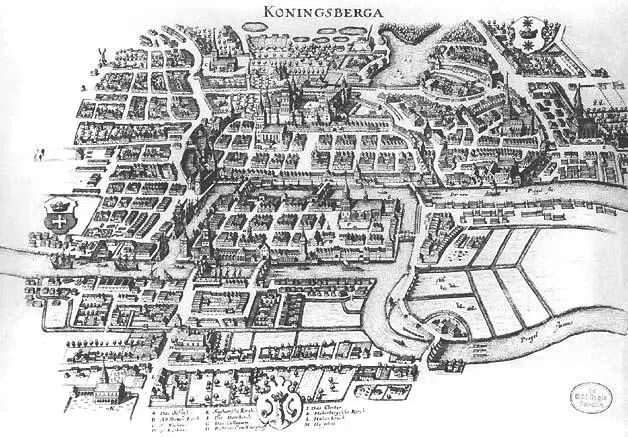
Accompanied by such monotonous life, it is a magnificent era, an era of enlightenment and the French revolution. This person who seems to have no waves in life, but the great changes in the whole era are highly specified by themselves. The method is reflected. Kant's famous paper "Answer this question: What is enlightenment? ", He said here that the enlightenment is to use his own reason bravely to get rid of the state of being monitored. What is the state of guardianship? That is the state of obedience to authority, and others tell you what to think and what to do. To use your own reason freely and dare to use your own reason. That is the basic spirit of the enlightenment campaign summarized by Kant.
He was also affected by Newton. In his early years, Kant was very interested in natural sciences and achieved achievements. In 1755, he published the "History of Nature and Astronomy" anonymous, which is an important book in the history of science. The basic principles of Newtonian mechanics put forward the nebula hypothesis of the origin of the universe. Known as "Kant -Laplas Nebula hypothesis", this is a very important theory about the formation of the universe until now. Kant once made such a judgment: "Give me a material, I can use it to make it with it. A universe! "But in his early study of natural science, he has already shown a very distinctive trend. He not only pays attention to natural science, but also pays attention to all kinds of philosophical issues that are associated with natural sciences, or he pays great attention to It is a problem of the philosophical foundation of natural science, so we will see that his basic philosophical position is closely related to the development of modern natural science. Therefore, with the background of the knowledge of Wang Guowei at the time, to understand his basic philosophical position, he did pay very hard efforts. Rousseau was a character who was very interested in later. He used to have such a discussion, which roughly means that for a long time, he felt that what he had to do was nothing more than to understand the world as much as possible. This reminds us of the Descartes, Aristotle in "Sacred School", and even the Faust in Goethe's writing. For them, a person's natural mission is to know. Kant went on to say that Rousseau taught him, so that he knew to respect people and made him feel a philosophy. If it was not to maintain the freedom and dignity of people, it would be worthless. Therefore, Rousseau in Kant's eyes is a sincere and sincere maintenanceer of freedom and dignity, which is a defense and confession of Rousseau. This is very different from many people we mentioned before.
Kant's most important book "three major criticisms" was published by him about sixty years old. Of course, he did not say that at that time, his thoughts were mature at that time, but he suddenly felt that he was old and could not be too late to write a tragedy. It came out. We all know that these three major criticisms are "Pure Reason Criticism", "Practical Critical Criticism" and "Critical Criticism". In the simplest way to distort, the main study of "Pure Rough Criticism" mainly studies the issue of epistemology, which discusses how to understand the outside world, and whether this understanding has its restrictions. It can also be said that it studies the problem of "knowledge". "Practical Criticism" can be said to be the problem of ethics or moral philosophy. What is "good" and what is the right moral law. What "Judgment Criticism" is more solved, more about the problem of purpose and "beauty", what is the nature of beauty. People usually say that there are different categories of beauty. For example, people generally distinguish between lofty and beautiful, which seems to be two different aesthetic categories, such as "the desert is lonely and straight, the long river is sunny". "People" "Yangliu Anxian Xiaofeng and Wind Moon" is different, but these two different things have the value of aesthetic, so what are their characteristics? For another example, nature has created thousands of worlds, thousands of species, and especially created humans who are long as the spirit of all things. So does the entire nature itself have the highest purpose? These issues related to the beauty and purpose are the issues to be solved in the criticism of judgment. The three major criticisms constitute the most important works in the Kant philosophy system. They all have the corresponding space similar to rewriting. The "Principles of Morality and School" published in 1785 is largely a rewriting of "Practical Critique".
"Pure Critical Criticism" 1794 Edition title page
Kant's life is divided into "pre -critical period" and "post -critical period" because of these major criticisms. This "criticism" is of course different from the common meaning in our Chinese context. Here is a strict reflection. For example, "Pure Reason Criticism" is to examine whether human rationality has the ability to understand. If you have the ability to recognize, whether this ability to know is unlimited or restricted. It can also be said that criticism is such a spirit of reflection.
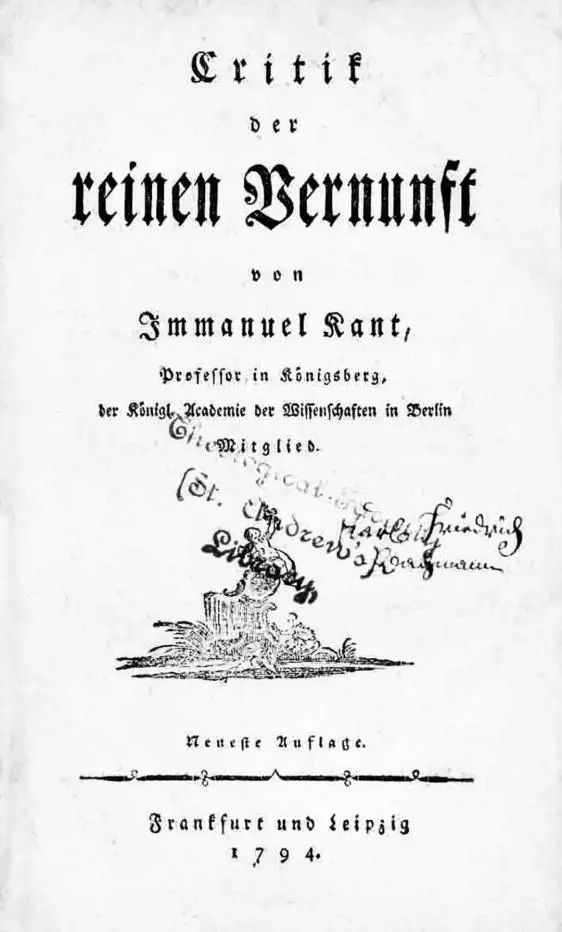
Kant's basic theoretical position
Let's simply explain the basic theoretical position of Kant. Any textbook will say that Kant's philosophy can largely be regarded as a combination of empirical and rationalism. Of course, it is not a simple synthesis, but it can also be said to be a transcendence of these two factions. We have said that modern philosophy uses epistemology as the most basic issue. Where does human understanding come from? Is there any restriction on human cognitive function? What is the nature of truth if humans can recognize the truth? These issues constitute the main problems of epistemology, and empiricalism and rationalism, with philosophical positions with regional colors in the United Kingdom and continental Europe, have become two genres that communicate with each other but also opposite each other. Kant's influence of these two factions is very great.

We can imagine that Kant, as a natural scientist who is full of enthusiasm for modern natural science and achieved success, will naturally place such a question at the center of your own thinking: Where is the general effectiveness of modern science? Natural science, especially Newton's classic mechanics system, is suitable for the entire phenomenon world. It can effectively explain and answer various questions related to various natural phenomena. Where is its general effectiveness? This is the problem that Kant gives himself. The position of rationalism believes that the concept of human rational cognition or talent is the source of all knowledge. But there is a problem in it. If I have a talented concept and I have a talented rational understanding ability, where does the new knowledge come from? If everything is talented and everything is inner, how can I get new knowledge? However, natural sciences are constantly providing people with new understanding of nature. However, from the perspective of empiricalism, although experience can continue to provide new things, there are also problems. We have said that if the premise of empiricalism has been pushed to its logical extremes and to Hume's point, then the laws and inevitable contacts will become the habit of human psychological association. There is no objectivity and no universal effectiveness. In the early years of Kant, he lived in the atmosphere of rationalism. Later, he said that Hume broke his dogmatic dream. In other words, when he read Hume, he felt that Hume's destruction of cause and effect and must be connected; if you admit his premise, he is logically impeccable. Hume made him deeply feel a urgent question: how to establish a philosophical foundation for modern natural sciences. Kant's efforts are indeed a comprehensive and transcendence of rationalism and empiricalism.
In the simplest way, we have to talk about his basic philosophical position. Two works are worth seeing. One is the speech "Kant's" Pure Critical Criticism "by Mr. Zhang Shiying, Peking University; "Criticism of Critical Philosophy", college students in the 1980s knew Li Zehou. Even Tsinghua's engineering students, there would be a book in the dormitory.
Kant Manuscript
Where does human knowledge come from? Religiousism determines that knowledge comes from the concept of human talent and is the product of the rational function of talent. Experienceism believes that people's sensory passively accepts external stimuli, and various feelings and perceptions are constantly accumulated, processed, sorted, and promoted, forming human knowledge. The former emphasizes the function or talent of human understanding, while the latter emphasizes the stimulus effect of the outside world's sensory sense. In Kant's view, knowledge includes both the elements from the outside world and the elements of the subject of the knowledge from human beings. In other words, knowledge is the product of objects and subjects, contact, and mutual inspiration. There is no existence of objects, no existence of the external world, and no role in the perception of the external world on people. It is impossible for people to have knowledge. However, people or subjects they know are not as whiteboards as Locke's conceived, which is completely passive and negatively accepted by external stimuli. On the contrary, it has a subjective function, category, and form to take the initiative to take the initiative to take the initiative to take the initiative to take the initiative to take the initiative Land, actively organize, process, and construct a cognitive object. Knowledge is the result of the interaction between factors in both inside and outside.
For example, Kant proposed that time and space are the forms of understanding the external world that the subject itself has. Time and space are the meaning of physics and the most philosophical meaning. Augustine lamented, what is time? If you don't ask me, I still know, as soon as I ask me, I am confused. Until the era of Newton, people always think that time and space are the form of external things. The space is like a large bucket. All foreign objects are stored in the space. It is the order of the incident. Kant proposed that time and space are not external, and time and space are the forms of understanding the outside world inherently. In other words, we say that everything is in time and space, which is right. However, it is generally believed that everything is in time and space because the external space -time accommodate everything; and Kant's statement is that we must have a recognition form such as time and space to understand the external world of the outside world. So everything must be in time and space for us. In other words, there are two different ways to be established, "Everything is in time and space". One way is that all things and all events exist in the external space -time. And Kant provided another way, another idea: the foreign object itself does not matter the time and space. In the form and category of compilation and tolerance, time and space are the forms inherent in human beings to understand and accept the external world. Therefore, everything is in time and space, but for people, not for external things itself.
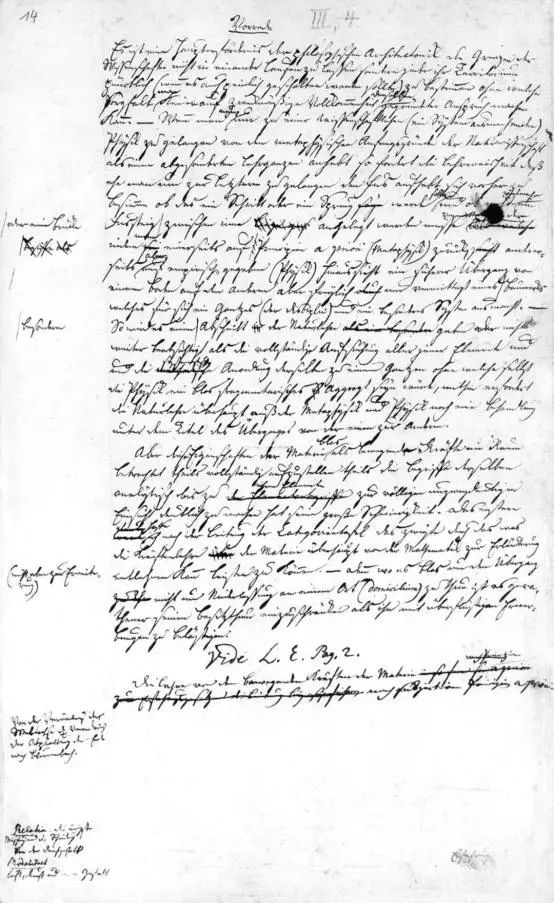
Kingdom Victoria Portrait
Then, in addition to time and space, in Kant, the category and concepts such as cause and effect are the category of understanding the outside world. Therefore, from this perspective, since all the subjective subjects are in the form of time and space and the category of cause and effect, there is no knowledge on the one hand without external sensory experience; on the other hand The subject -all people are processed, sorted, accepted, and accommodated with foreign stimuli in the forms and categories of time and space. Therefore, because human scientific knowledge continues to accommodate various experiences, there will be new knowledge; and because of generally effective forms and categories to process and organize experiences, it is generally effective. For everyone, it is for everyone. Can be established. This is the most basic philosophical position of Kant. These positions we have told so much as much as possible. Interested students can read related books. From such a philosophical position, a question comes out immediately: In this philosophical position, is the world one or two? In Kant, of course, there are two, there is an autologous or body world, and there is a world of phenomenon. What is the auto -body and what is the world of phenomena? The external world and external things itself does not matter when it is time and space. It does not matter the cause and effect. It is itself the body, that is, the authentic, and the English is called the Thing-ITSELF. But can people recognize such a body or object? It is impossible, because when we understand, understand, and feel the world, we have inevitably processed and sorted, making it bring the category and form of our understanding subject.
We say that foreign objects do not care about time and space, but everything we observe is all in time and space. In fact, this concept seems to be very different from our common sense, but it is not very difficult to understand. For example, each of us’s visual color perception must be different. Otherwise, the physical examination will not be weak or color blindness during the physical examination. We can believe that everyone's perception of colors will definitely not be exactly the same. We can say that the color of the table in the eyes of anyone will not be the color it originally, is it? This is the simplest and inappropriate metaphor to show such a philosophical position. From such a philosophical position, there are two worlds: ontology and phenomenon.
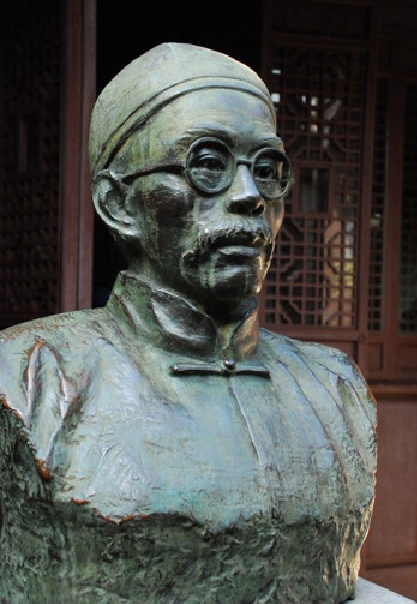
Starting from such an idea, it is easier for us to understand the proposition of Kant's so -called "human natural legislation". According to the perspective of common sense, the law of nature is a revelation and reflection of human minds on the laws of the object objective existence. However, from the perspective of Kant's standpoint, humans or subjects they know do not simply reflect nature, but to organize, process, and construct the external world in their own forms and categories. In this sense, it can be said that man -made natural legislation. So Kant proudly said that he completed a Copennie -style revolution in philosophy -the entire center changed. Before Kant, it can be said that the view is that knowledge is consistent with the external object. Since Kant, in the language we are familiar with, knowledge is the subject of cognitive knowledge with subjective initiative. In this sense, he did complete a Copenni -style revolution in philosophy.
We spent a little space to talk about Kant's basic philosophical position. From this basic philosophical position, of course, such inferences will be exported: Is there a boundary between a person's knowledge? Yes, why? What we have owned, such as cause and effect, inevitable, time and space, and other forms and categories, it can only be applied in the world of phenomena. Because, only what we can become an experience can have awareness. Can I know as a whole universe or world? No, because it is not what my experience can. Does God exist, people have souls, and people have free will? These things are not understood and recognized by scientific knowledge, because people are unable to experience. Therefore, Kant provides a philosophical foundation for the establishment of scientific knowledge and provides a philosophical argument, but he also draws a boundary for the scope of scientific knowledge. There are also so many issues involving life value and other aspects of life, outside the scope of scientific knowledge and people expect to understand. This is a very important level in Kant's thoughts, and it is also a very important reason we cannot understand "Pure Performance Criticism" only from the perspective of epistemology.
"Twelve Lectures on the History of Western Thought" | People's Literature Press
A popular and slightly humorous, very friendly Western thought history of the history of the West
Douban score 8.0 B station playback 504,000
Super Star Hot Course
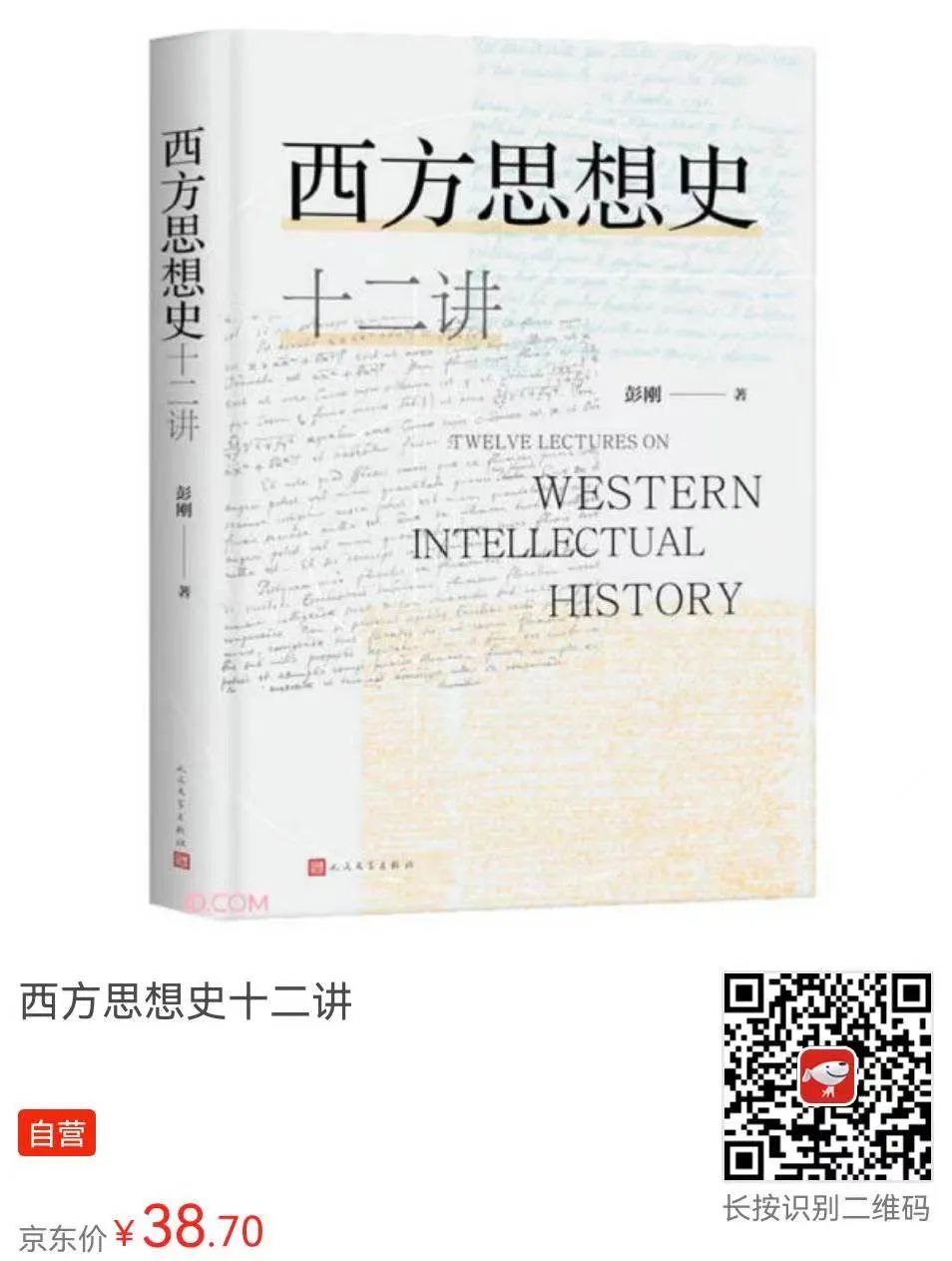
Explore the basic context of Western thought from Socrates to Kant
Discuss the spirit of key figures such as Plato, Rousseau, Kant and other key figures
This book is based on the classroom records of the author's lectures in Tsinghua University. It focuses on sorting out the philosophy of Greece since ancient times, and has been discussed by the history of theology, Renaissance, religious reform, scientific revolution, enlightenment movement, and the rise of modern ideas. The key figures and spiritual purpose in the history of Western thoughts such as Plato, Rousseau, Kant.
The content is simple and clear, and the logic has expanded the real dimension in the sideline.In addition to the necessary streamlined and supplement, this revision also refined more detailed points and directory, so that readers can read and think.Preliminary review: Chen Yue
Manuscript review: Wang Wei
Manuscript final trial: Wang Qiuling
Data-nickName = "People's Literature Press" Data-ALIAS = "RWCN166" Data-Signature = "Everyone's heart should hide a literary work. Here, find the" one "that belongs to you ..."data-from = "0" />
- END -
Just now, the Chengdu Biennale ushered in the 1 million audience!

The long -term exhibition period that lasted more than 8 months, and there were mo...
The outrageous, the Qi Gong calligraphy on the Student Student Certificate of Beishi is actually fake

Without an expert, students can see that it is fakeRecently, the school motto writ...